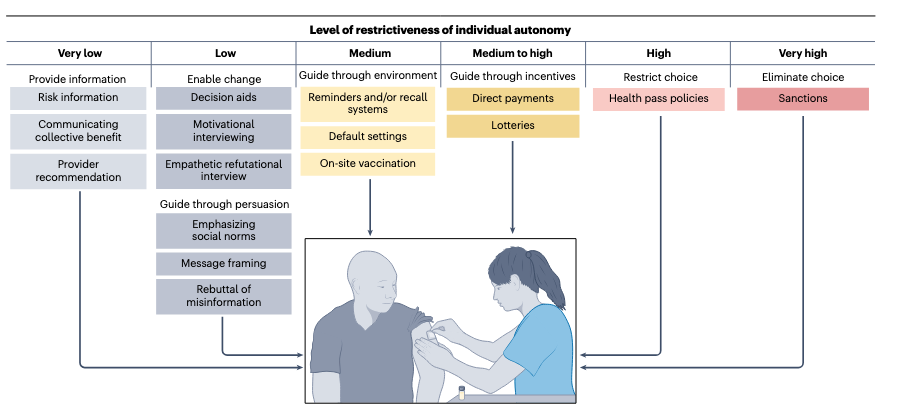Increasing vaccination rates: strategies beyond compulsory vaccination
Compulsory vaccination sparks intense global debate, yet it represents just one approach to boosting vaccination rates. A review study published in Nature Reviews Psychology by an international team led by Prof. Cornelia Betsch of the Bernhard Nocht Institute for Tropical Medicine (BNITM) and the University of Erfurt explores alternative strategies. The study evaluates the effectiveness, ethical considerations, and psychological impacts of mandatory vaccination and highlights other measures that could encourage vaccination while respecting individual autonomy.

Mandatory vaccination is often perceived as a straightforward way to increase vaccination rates. However, it tends to overlook the cognitive, emotional, and social factors driving vaccine hesitancy. The researchers argue that instead of relying solely on coercion, strategies should address these barriers while preserving individual autonomy. Their study examines the benefits and drawbacks of mandatory vaccination and introduces a “toolbox” of alternative approaches. These include information campaigns to tackle cognitive and emotional obstacles, social mechanisms that encourage vaccination as a collective responsibility, and financial incentives to nudge individual decisions toward vaccination.
The study is grounded in an extensive review of current research on vaccination mandates and alternative strategies for increasing vaccine uptake. The authors synthesised data from international studies, encompassing psychological experiments, surveys, systematic reviews, and meta-analyses, to evaluate the effectiveness of different interventions across diverse cultural and societal contexts. To deepen their analysis, the team incorporated psychological frameworks such as reactance theory and the 5C model, which elucidate the cognitive and emotional underpinnings of vaccine hesitancy. By combining empirical evidence with theoretical insights, the study offers robust, science-based recommendations tailored to diverse population groups, emphasizing flexibility and cultural adaptability.

Measures that specifically address the psychological mechanisms of vaccine hesitancy are a key component of the proposed alternatives. Many people have fears or reservations that can be reduced through targeted education and individually tailored counselling. Psychological models such as the so-called 5C model (confidence, collective responsibility, carelessness, comfort and calculation) offer important insights into how to reduce vaccine refusal. One example is 'empathic interviewing', in which doctors specifically address the concerns and worries of vaccine sceptics in order to increase their motivation and promote an informed decision.

“Mandatory vaccination can indeed raise vaccination rates, but it is an intrusive measure that often encounters resistance,” Cornelia Betsch says, head of the Health Communication research group at BNITM and the University of Erfurt. “This resistance can reduce acceptance and even provoke backlash. Fortunately, there are effective alternatives that address the psychological roots of vaccine hesitancy while respecting individual autonomy.”
Financial incentives are another potential complement to mandatory vaccination. Measures like direct payments or lottery systems can shift individual cost-benefit calculations and have been shown in studies to effectively boost vaccination rates. However, these incentives must be applied with care to address ethical concerns. For instance, individuals with lower incomes may feel disproportionately pressured by financial rewards, raising questions about fairness and autonomy.
The study offers clear, actionable recommendations for medical practitioners and policymakers. For instance, doctors are encouraged to engage empathetically with vaccine-hesitant individuals, addressing the social, cognitive, and emotional factors behind their concerns. Policymakers, in turn, are advised to prioritise less restrictive, science-based strategies to foster vaccine acceptance. Philipp Schmid, a professor at Radboud University in the Netherlands and first author of the study, who is also part of Betsch's research group at BNITM, summarizss: “The toolbox we present provides a range of intervention options that can be tailored to the specific needs of the population. This adaptability is key to achieving consistently high vaccination rates and building long-term trust in public health measures.”
Original publication
C. Betsch, P. Sprengholz et al.: Vaccination mandates and their alternatives and complements. Nature Review Psychology (2024).
Contact person
Prof. Dr Cornelia Betsch
Research Group Leader
Email : cornelia.betsch@bnitm.de
Julia Rauner
Public Relations
Phone : +49 40 285380-264
Email : presse@bnitm.de
Dr Anna Hein
Public Relations
Phone : +49 40 285380-269
Email : presse@bnitm.de
Further information






